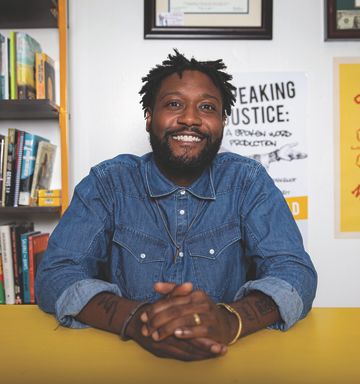It was a prolific year for local authors. Popular favorites like Rita Mae Brown, John Grisham, and Ann Beattie added new titles to their extensive catalogs. Several UVA professors published in-depth explorations of their expertise—from tracing the history of Jefferson’s university, to defining the basis of a scientific claim, to analyzing politics’ impact on the cigarette. Poetry collections explored relationships and the natural world, memoirs shared stories of loss and change, and dramatic novels offered timely plots about privilege and saving ecosystems. Here are some of the books we enjoyed.—Cortney Phillips Meriwether
Non-fiction
Laurance Wieder, Poetry History Music Art
Containing 23 essays from the last 25 years of publishing, this collection explores Homer, Lady Murasaki, Orhan Pamuk, Evliya Çelebi, William Blake, John Milton, and more.
Alan Taylor, Thomas Jefferson’s Education
From the Thomas Jefferson Foundation Professor of History at UVA comes an absorbing study of the origins of Jefferson’s university.
James C. Zimring, What Science Is and How It Really Works
Written for a general audience, this book seeks to define science and answer key questions, such as: What is the basis of scientific claims? And how much confidence should we put in them?
Gregory Orr, The Blessing
Newly re-released, this memoir begins with the hunting accident where a young Orr accidentally shoots and kills his brother. Told in sparse, short chapters, this poetic exploration is a testament to the power of art.
Jerry Ratcliffe and Chris Graham, Team of Destiny: Inside Virginia Basketball’s Run to the 2019 National Championship
From the stunning first round defeat in 2018 to the program’s first national title in 2019, this book traces Tony Bennett and his team’s path to victory.
Ahmed al-Rahim, The Creation of Philosophical Tradition
From a professor of Islamic Studies at UVA comes a detailed history of the Avicennan tradition from the 11th to 14th century.
Charlotte Matthews, Comes With Furniture and People
This memoir tells the story of a daughter who watches her mother struggle with depression—and what happens to her after she loses her mother to leukemia and faces a breast cancer diagnosis of her own.
Chris Register, Conversations With US: Great Lakes States
The first installment in an eight-part series, this book follows a cycling journalist across the Great Lakes states as he seeks to “uncover the truth about our shared hopes, challenges, and potential.”
Njelle W. Hamilton, Phonographic Memories: Popular Music and the Contemporary Caribbean Novel
Analyzing the narrative and thematic influence of Caribbean music on the Caribbean novel, this book explores the cultural and national impact of these “musical fictions.”
Sarah Milov, The Cigarette: A Political History
Sharing the “untold political story of the most controversial consumer product,” this book chronicles the rise and fall of tobacco’s popularity.
Fiction
Rita Mae Brown, Scarlet Fever
The 12th book in the “Sister Jane” series, this murder mystery set in the Blue Ridge Mountains pays homage to fox hunting and the traditions of Virginia horse country.
John Grisham, The Guardians
Quincy Miller has spent 22 years in prison for a murder he maintains he didn’t commit. His last hope to prove his innocence is a nonprofit organization called Guardian Ministries, run by lawyer and minister Cullen Post.
Bruce Holsinger, The Gifted School
Following the drama between a group of friends and parents after an exclusive school for gifted children opens in their community, this novel explores ambition, privilege, and the ripple effect that choices can have.
R. Barber Anderson, The Sunken Forest
This ecological thriller tells the story of an extraordinary forest, a billionaire trying to exploit its natural resources, and the hero who risks it all to protect it.
Christopher Tilghman, Thomas and Beal in the Midi
In 1892, an interracial couple escapes post- Reconstruction America to a new life, first in Paris and then as winemakers in the Languedoc countryside.
Ann Beattie, A Wonderful Stroke of Luck
Beginning at a boarding school in New Hampshire, this novel follows the effects of a complicated relationship between a gifted student and a problematic teacher.
Poetry
Laurance Wieder, After Adam: The Books of Moses
Told in prose and verse, this genre-bending book begins with the creation of humans and ends with the death of Moses.
Brian Teare, Doomstead Days
A collection of site-specific poems documenting rivers, cities, forests, oil spills, mountains, and apocalyptic visions.
Gillian Conoley, A Little More Red Sun on the Human: New & Selected Poems
Using narrative, lyric, and fragmented forms, this collection explores democracy, metaphysics, motherhood, gender, and race.
Mariflo Stephens, Dream Straw
Stephens’ poetry deals with relationships, family, death, and identity.
Gregory Orr, The Last Love Poem I Will Ever Write
A lyrical collection of grief, love, and the power of language.
Charles Wright, Oblivion Banjo
A collection of selected work from the Pulitzer Prize winner and former poet laureate of the United States.
Irène Mathieu, Grand Marronage
Examining the lives of Creole women of color, this collection explores themes of community, identity, and liberation.



